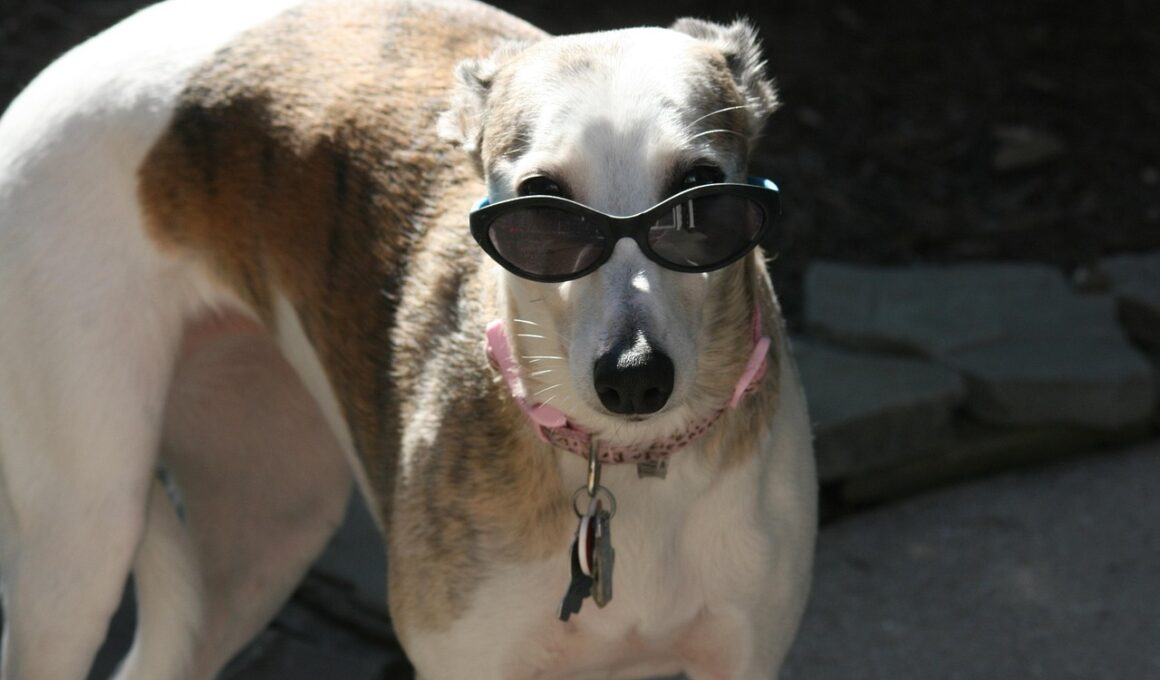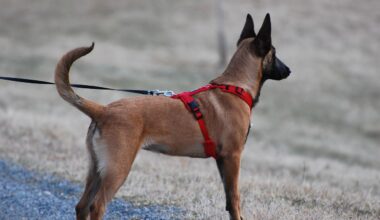Separation Anxiety in Whippets: How to Help
Separation anxiety is a common issue among Whippets, a breed known for its affectionate nature and close bond with their owners. Understanding this condition is crucial for providing the best care for your pet. Whippets thrive on companionship and often struggle when left alone. This anxiety can manifest in various ways, including destructive behavior, excessive barking, and attempts to escape. Identifying the signs of separation anxiety early on allows for effective intervention. It’s vital to assess your Whippet’s behavior when alone and monitor their reactions. Regular check-ins during periods of separation can greatly assist in properly diagnosing the condition and leading to solutions. While every dog is unique, typical symptoms include pacing, whining, and disinterest in food or toys. Moreover, recognizing any potential triggers can be beneficial in managing separation anxiety. Lack of exposure to alone time during puppyhood may contribute to developing these challenges later. Early training and socialization can lay the groundwork for a calmer adult Whippet. By addressing these issues, you provide your beloved pet with a happier, healthier life.
Establishing a routine is one effective strategy to help combat separation anxiety in your Whippet. Dogs thrive on predictability, and a consistent schedule can reduce anxiety levels. Start by creating a daily routine that includes regular feeding, exercise, playtime, and potty breaks. By adhering to this routine, your Whippet will better understand what to expect, making them feel more secure and relaxed. Additionally, incorporating engaging activities into your Whippet’s daily plan will stimulate their mind and body, thereby reducing the urge to react negatively when alone. Try including puzzle toys, interactive games, or obedience training during these sessions. Gradually increasing the time spent away from your Whippet can help them acclimate to separation. Begin with just a few minutes and gradually extend this time. If your dog begins to show signs of distress, reward calm behavior to reinforce positive coping strategies. Leaving a piece of your clothing can also provide comfort by reminding them of your presence. Consider investing in calming aids, including soothing music or anti-anxiety treats. Monitoring progress is essential to ensure your strategies are effective.
Training Techniques to Alleviate Anxiety
Training your Whippet with positive reinforcement methods can significantly alleviate separation anxiety. Focus on teaching basic commands and tricks that enhance their confidence and strengthen your bond. Consistent, patient training encourages your dog to trust in your presence, even when you’re apart. When introducing commands, use rewards like treats or praise to motivate your pet, making learning enjoyable and effective. Incorporate ‘leave it’ or ‘stay’ commands to build self-control, which is particularly beneficial when you leave the house. It’s crucial to remain calm during departures and arrivals since your behavior can influence your Whippet’s emotional state. Keeping these moments low-key prevents creating anxiety associated with your comings and goings. Short, yet frequent, training sessions are ideal to maintain your dog’s interest while reinforcing positive behaviors. Gradually, this can lead to your Whippet feeling more comfortable during alone time. Alongside obedience training, consider utilizing crate training as a secure space for your dog. A crate can act as a safe haven, especially when conditioned correctly to be associated with comfort and security.
One popular method for managing separation anxiety is desensitization, which involves gradually acclimatizing your Whippet to being alone. This technique requires patience and persistence but can yield significant results. Start by leaving your dog alone for short durations, then slowly incrementally increase the time away as they become accustomed to the separation. During these short absences, ensure that your Whippet remains engaged with toys or treats to prevent boredom. Also, consider implementing a targeted distraction strategy before leaving, such as a challenging puzzle or a favored chew toy. Providing mental stimulation can keep your Whippet entertained and help them associate alone time with positive experiences. Additionally, utilizing background noise, such as a television or soothing music can create an environment that feels less lonely. As your dog successfully handles longer absences, you can gradually extend the duration you are away. Remember that every dog is different; some may take longer to adjust than others. Be diligent and patient, rewarding your Whippet for handling alone time calmly, and avoiding excessive praise upon your return.
Creating a Comforting Environment
Creating a comfortable environment for your Whippet when you’re away can significantly alleviate their anxiety. Make sure your home is a safe haven by limiting access to potentially harmful items and ensuring they have a cozy space to retreat. Consider designating a specific area with comfortable bedding, their favorite toys, and anything else that adds comfort. Having familiar scents, such as an unwashed T-shirt, can create feelings of security while you’re absent. You might even opt to create a designated ‘safe space’ in your home, where your Whippet can feel secure when they become anxious. Including calming elements, such as a heated blanket or a cozy crate with an open door, can enhance this area. This approach allows your dog to choose their retreat as needed. Enriching their environment with various toys can help keep them busy while you’re gone. An interactive toy that dispenses treats can both entertain and reward them during your absence. Whippets enjoy social interaction, so exploring technologies like dog cameras can also provide reassurance and a means to connect while apart.
Socialization plays a crucial role in reducing anxiety in Whippets. It trains your dog to handle new experiences, helping them feel confident in various situations. Introduce your Whippet to diverse environments and different people or dogs gradually. Socializing them while they are young allows your dog to adapt better to new experiences throughout their lives. Regularly participating in group training sessions or playdates can facilitate this process. Positive interactions lead to the development of essential life skills that stimulate their minds and reduce anxiety. Take your Whippet to local parks or events to expose them to the various sights and sounds of the world. This exposure teaches your dog to remain calm and engaged when facing unfamiliar situations. Also, consider utilizing professional training classes specialized in anxiety reduction techniques. These classes provide a structured approach, ensuring your Whippet learns coping mechanisms under the guidance of an expert. The more proactive you are in socializing your Whippet, the better equipped they will be to handle time spent apart from you. Engaging them in supervised playtime will help foster social skills needed for a balanced life.
Consulting a Professional for Guidance
If your Whippet’s separation anxiety persists despite your efforts, seeking professional help may be necessary. A veterinarian or certified dog trainer specializing in behavioral issues will provide valuable insights into managing anxiety effectively. They can assess your dog’s specific situation and recommend personalized strategies tailored to your Whippet’s needs. In some cases, medication may be suggested to help manage anxiety levels. A holistic approach that combines both behavioral training and medication may provide the best results for your dog. Additionally, exploring complementary therapies like dog massage or aromatherapy can have calming effects. Consulting with a professional also opens up opportunities to learn more about canine behavior and specific triggers contributing to anxiety in your Whippet. Joining community groups focused on dog training and behavior can provide further support and resources. Sharing experiences with other Whippet owners can build a support network invaluable in helping navigate separation anxiety challenges. Don’t hesitate to reach out for assistance if needed; the goal is to ensure happiness and wellbeing for you and your beloved Whippet.
Remember, addressing separation anxiety in Whippets takes time, patience, and understanding. Each dog is unique, and responses to various strategies might differ dramatically. Regularly reassess your methods and adjust as necessary to enhance their overall comfort and security. Celebrate small successes, and continue to work on your Whippet’s confidence; every achievement contributes to a calmer, more relaxed dog. Also, the importance of creating a strong bond with your Whippet cannot be underestimated, as it significantly influences their behavior and emotional stability. Spend quality time together engaging in activities you both enjoy. The stronger the relationship, the better your Whippet will cope with any separations you face. Making training and socialization a priority will contribute significantly to managing separation anxiety. Patience is key throughout this journey; it’s essential to remember that progress may take time. A consistent approach and a loving environment foster emotional wellness and stability in your Whippet. Monitor their behavioral changes to ensure continued success in managing their anxiety. Ultimately, you’ll create a secure, loving life for your Whippet, contributing positively to their happiness and overall health.


